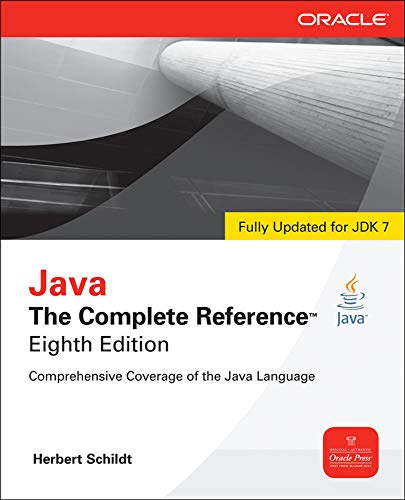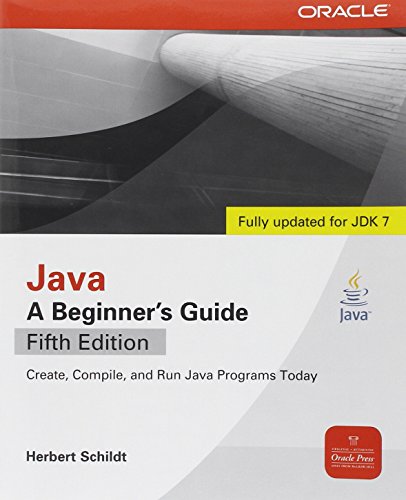(Part 3) Top products from r/java
We found 25 product mentions on r/java. We ranked the 183 resulting products by number of redditors who mentioned them. Here are the products ranked 41-60. You can also go back to the previous section.
41. Python Programming: An Introduction to Computer Science
Sentiment score: 0
Number of reviews: 2
Used Book in Good Condition
 Show Reddit reviews
Show Reddit reviews43. Algorithms (4th Edition)
Sentiment score: 1
Number of reviews: 2
Addison-Wesley Professional
 Show Reddit reviews
Show Reddit reviews45. Java The Complete Reference, 8th Edition
Sentiment score: -1
Number of reviews: 1
 Show Reddit reviews
Show Reddit reviews47. Enterprise Integration Patterns: Designing, Building, and Deploying Messaging Solutions
Sentiment score: 0
Number of reviews: 1
 Show Reddit reviews
Show Reddit reviews48. C++ Coding Standards: 101 Rules, Guidelines, and Best Practices
Sentiment score: 0
Number of reviews: 1
 Show Reddit reviews
Show Reddit reviews50. Applying UML and Patterns: An Introduction to Object-Oriented Analysis and Design and the Unified Process (2nd Edition)
Sentiment score: 1
Number of reviews: 1
 Show Reddit reviews
Show Reddit reviews52. Introduction to Algorithms, Third Edition (International Edition)
Sentiment score: 1
Number of reviews: 1
Mit Press
 Show Reddit reviews
Show Reddit reviews54. Structure and Interpretation of Computer Programs - 2nd Edition (MIT Electrical Engineering and Computer Science)
Sentiment score: 0
Number of reviews: 1
NewMint ConditionDispatch same day for order received before 12 noonGuaranteed packagingNo quibbles returns
 Show Reddit reviews
Show Reddit reviews55. Java EE 8 Cookbook: Build reliable applications with the most robust and mature technology for enterprise development
Sentiment score: 0
Number of reviews: 1
 Show Reddit reviews
Show Reddit reviews56. UNIX and Linux System Administration Handbook, 4th Edition
Sentiment score: 0
Number of reviews: 1
NewMint ConditionDispatch same day for order received before 12 noonGuaranteed packagingNo quibbles returns
 Show Reddit reviews
Show Reddit reviews57. The Practice of Programming (Addison-Wesley Professional Computing Series)
Sentiment score: 1
Number of reviews: 1
 Show Reddit reviews
Show Reddit reviews58. Core Java, Vol. 2: Advanced Features, 8th Edition
Sentiment score: 2
Number of reviews: 1
 Show Reddit reviews
Show Reddit reviews







Since you want to learn java and esp. OOP, I would say start with a good book. I like Core Java Vol. 1 and Core Java Vol. 2 but you can start with any book you like.
Download Java from Oracle since they have version 7 for Lion.
For editor, I would stay away from any full featured IDE like Netbeans or Eclipse in starting phase. Start with TextEdit or Sublime Text. Write few code by yourself and compile it using Terminal. This way you will learn the compilation process. All IDEs compile files automatically so you can't learn what is going on behind the screen. If you use command line, you will also learn CLASSPATH, packages, class creation etc.
You should use command line for first 2-3 months only or may be less depending upon your learning curve. After that you can choose IDE. By that time, you will also good knowledge to judge which IDE is good for you. Netbeans and Eclipse both are good and free. I like Netbeans.
Good luck with your learning process.
I have no formal training in CompSci, but this book seems like a pretty standard 1st or 2nd year text. It's one of the best technical book purchases I ever made, imho: Applying UML and Patterns: An Introduction to Object-Oriented Analysis and Design and the Unified Process by Craig Larman. I would recommend it to anyone who wants to learn programming. Goes great with the classic "GoF" book, Design Patterns. For any particular language's syntax and libraries, I just read the docs and check stackoverflow or IRC for any tricky idioms and for best practices.
If you want to learn java, it's difficult to emphasize how good the official tutorials are.
I feel they're, for some reason, much underrated/overlooked.
http://docs.oracle.com/javase/tutorial/
For general programming advice, there are plenty of books out there. It depends a lot on how much of an effort you're willing to make for example. I could recommend you SICP, Little Schemer, and K&R2, which are three books I believe will teach you a lot of programming, but they take a lot of effort to read/go through (I used to underestimate this, but I've seen lots of people trying to follow these books and not being able to -- this was a surprise to me).
None of this uses Java, but I believe they're very good books on teaching you how to program well.
You mentioned Robert Sedgewick. His book, Algorithms and his online courses are highly recommended. And he uses Java in them.
http://www.amazon.com/Algorithms-4th-Edition-Robert-Sedgewick/dp/032157351X
http://algs4.cs.princeton.edu/home/
For object-oriented design the Head First books are great. It also worth to have the classic book Design Patterns: Elements of Reusable Object-Oriented Software.
http://www.amazon.com/dp/0201633612
I also recommend the books Code Complete, and Clean Code, they are great.
The stuff you are learning in CS class is definitely important, but it's orthogonal to the things you will need to learn in the industry.
Read "Code Complete" to get a head start on this stuff. - https://www.amazon.com/Code-Complete-Practical-Handbook-Construction/dp/0735619670
As far as some fun interviews with famous programmers, another great book is https://www.amazon.com/Practice-Programming-Addison-Wesley-Professional-Computing/dp/020161586X
I have Beginning Java. It's very comprehensive, but geared towards beginners. So it can get dry at times. Great reference for later on.
Only downside is, it's not one of those learn java fast books. It covers everything properly and thoroughly.
Also pretty cheap for such a large book.
Java Precisely, 2nd Edition
http://www.amazon.com/Java-Precisely-Peter-Sestoft/dp/0262693259/ref=sr_1_1?ie=UTF8&qid=1395002387&sr=8-1&keywords=java+precisely
It's fucking awesome. It's not a complete reference (the javadocs are best for that), but it's the kind of thing you can pretty much skim in a day and know the whole language.
Not Java-specific, but this book should give you a solid foundation and will serve as a good reference manual too.
The official tutorial is available as a book. It's very straight forward and easy to understand.
I have enjoyed reading Spring in Action thus far: http://www.amazon.com/Spring-Action-Craig-Walls/dp/1935182358
If you want a deeper understanding of concurrency, the go-to book is Concurrency in Practice.
For Spring, the go-to book is Spring in Action.
The best book I've read for OOP is Agile Patterns, Practices and Principles for C#. The first 1/3 of the book is Agile stuff, but the rest is a wide variety of topics in OOP. There used to be a Java version of this book, but the newer version is C#. But the C# code is nothing to different than what you would do in Java.
If you're looking to only learn Java as a language, I would also recommend Absolute Java (http://www.amazon.com/Absolute-Java-Student-Value-Edition/dp/0132834235). It is a bit pricey, but you can probably find a used 4th edition for a quarter of price, and it is very thorough/complete. However, it will most likely overlap a lot with the book you already have (but it's nonetheless a book suggestion).
https://www.amazon.com.br/Java-Cookbook-applications-technology-development-ebook/dp/B076X7P5ZM
> http://www.amazon.com/gp/aw/d/1590282418?cache=ce3142468b03545c10a957e22cf7266d&pi=SY200_QL40&qid=1407729669&sr=8-1#ref=mp_s_a_1_1
And if that wasn't enough, you could still try http://www.amazon.com/Modern-Rustic-Homesteading-Greenhouses-Self-Sufficiency-ebook/dp/B00M8UFFT6/ref=sr_1_2?ie=UTF8&qid=1407821257&sr=8-2&keywords=gardening
If python is an option, I would look for John Zelle.
http://www.amazon.com/gp/aw/d/1590282418?cache=ce3142468b03545c10a957e22cf7266d&pi=SY200_QL40&qid=1407729669&sr=8-1#ref=mp_s_a_1_1
I realize these are older titles but java is still built on the same principals.
http://www.amazon.com/Head-First-Java-2nd-Edition/dp/0596009208
http://www.amazon.com/Ivor-Hortons-Beginning-Java-Horton/dp/0470404140/ref=sr_1_1?s=books&ie=UTF8&qid=1407753555&sr=1-1&keywords=beginning+java
Its not advertised but it uses Java for the examples.
http://www.amazon.com/Algorithms-4th-Edition-Robert-Sedgewick/dp/032157351X
And of course: Enterprise Integration Patterns: Designing, Building, and Deploying Messaging Solutions
Just "Structure and Interpretation of Computer Programs" - http://www.amazon.com/Structure-Interpretation-Computer-Programs-Engineering/dp/0262510871
That's a lot to ask...
http://www.amazon.com/Linux-System-Administration-Handbook-Edition/dp/0131480057
Java: A Beginner's Guide by Herbert Schildt.
I would say either Core Java for the Impatient, or if you wanna get really concise Java Precisely (an unknown gem: https://www.amazon.com/Java-Precisely-Press-Peter-Sestoft/dp/0262529076/)
> if this is the worst of things he won't change on consider yourself lucky; there are loads of teams out there dealing with much worse
Agree with this response. I think it's telling that in Coding Standards the very first section is titled "Don't Sweat The Small Stuff". Professional developers should be able to read and understand a wide variety of conventions.
Developers have a bizarre ability to argue forever about trivial things like curly brace placement and naming conventions.
http://www.amazon.com/Java-Complete-Reference-Herbert-Schildt/dp/0071606300/
I picked up Java one summer (13 years ago) with an older version of this book. It assumes you're a programmer and shows you how to do things in Java. With your c# background, you'll make the transition no problem.